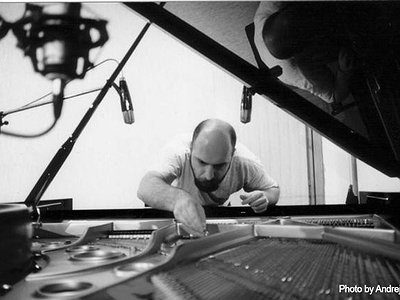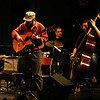Name: Zoran Scekic
Nationality: Croatian
Occupation: Composer / Innovator
Selected Bands/Projects: MiCROfest 2016 / Panmonism / Sphinx Avenue
Current Release: JUST MUSIC with Ravello Records
Recommendations: George Shearing solo piano version of Mack the Knife by Kurt Weill / Dersu Uzala by Akira Kurosawa
Website: If you enjoyed this interview with Zoran, visit www.zoranscekic.com for further information.
When did you start writing music - and what or who were your early passions and influences? What is about music and sound that drew you to it?
I started with playing guitar relatively late, at the age of 16. My father was a jazz guitarist and he was my first teacher. Less than a year later I'd already started writing music. From the very beginning, the main area of my interest was improvisation so as a result of my affinity with rock and blues music and my father’s affinity with jazz, my first influences were Jimi Hendrix and Django Reinhardt.
For most artists, originality is first preceded by a phase of learning and, often, emulating others. What was this like for you? How would you describe your own development as an artist and the transition towards your own voice? What is the the relationship between copying, learning and your own creativity?
Copying is learning!! Music knowledge is not based on information like a history lesson. You must learn it by doing it - like driving a car or even better, like speaking. As a child you first imitate the words that you hear from your parents without knowing their meaning. Later, by the reaction of your environment, to the words that you have spoken, you start to learn their meaning. In this way, you start to build your vocabulary that will serve you later on to express your thoughts and feelings, more or less…
Expanding the vocabulary, which is a process that you can maintain through your whole life, provides you with more possibilities. The same is with music - you learn your vocabulary by copying. Once you have mastered the basics, you can start 'speaking' and it still doesn't necessarily have to be you own thoughts, if there is such a thing…
Music is a language that doesn't have meaning, where the meaning of the word is the word itself. The only way to really understand this kind of language is not to pay attention to the words but to the relationship between the words.It is not important what the writer is writing about but how is he writing - grammar, phrasing, form, flow, construction etc. Music is not about semantics or pragmatics, music is all about syntax!So, in this abstract discipline, thinking about having 'my own voice' has always been as important to me as having my own way of walking! Everyone is unique and that is something that we already have within, so having your own voice is not something that you should work on but something that you cannot escape from – as long as you learn the craft and stay true to yourself.
I have a good story on that subject from the time of my studies when Wynton Marsalis had a workshop and one student asked him: "I've been told to practice transcriptions of Louis Armstrong solos but I'm worried because I don't want to sound like him…" Wynton just smiled and said: "You have nothing to worry about - nobody can sound like Luis Armstrong, even if he wants to!"
What were your main musical challenges in the beginning and how have they changed over time?
My first challenge and for many years later, was improvisation. In the beginning, it was blues and rock; I was listening the music of Elmor James, T-Bone Walker, Otis Spann, Jimi Hendrix, Alvin Lee and many others. As I advanced I got interested in jazz improvisation. For years, I've been analyzing and practicing solos from Pat Martino, Wes Montgomery, Chat Baker, Miles Davis, Blue Mitchell, Red Garland, Wynton Kelly and Phineas Newborn. At all that time, I was writing music as well, but it was all more or less short forms in the style of jazz standards and baroque music.
The first big turning point for me was when I heard Bill Evans - and surprisingly, it was not the first time that I’d heard him! Many times I’d heard Evans playing but that particularly moment when I was listening his improvisation on "Spring is here" from the album "Portrait in Jazz", I heard a completely new language in improvisation that I'd never heard before.
Next I started to listen and study the music of Chopin and Debussy. That was the beginning of my next challenge - composition. The first time I heard "The Rite of Spring" from Igor Stravinsky was a turning point. In the following years I stopped playing in guitar duos and trios and committed myself to writing music for big bands and chamber orchestras.
After some time under the influence of Anton Webern, Bela Bartok, Brian Ferneyhough and Alexander von Schlippenbach, I got interested in the synthesis of written and improvised music. For some time I was playing and composing in a combination of graphic and standard notation.The third and for now the last big turning point was contact with micro-tonal music. This is the area that I'm studying now and my biggest influences are Ivan Wyschnegradsky and ethno music. Standard tuning systems in today's music is based on division of the octave into 12 tones. Micro-tonal music, by its definition, is a system based on division of the octave into more or less than 12 tones. Octave division can be based on irrational numbers also known as equally tempered division or division can be made by the use of integer ratios, also known as natural intervals or ‘just intonation’. Just intonation is the area of microtonal music that I'm interested in, specifically the harmony based on five limit intervals.
How do you make use of technology? In terms of the feedback mechanism between technology and creativity, what do humans excel at, what do machines excel at?
Technology can be a means to an end but it can also be source of inspiration. As a composer, I mostly use technology to work within specific areas such as synthetic sounds, microtonal harmony or complex rhythmic structures. But technology can also mean I can achieve something in faster or in a more cost-effective way. As an innovator, I use technology to achieve new music possibilities that couldn't be achieved without it, for example my microtonal keyboard prototype Z-board. Technology and art go hand-in-hand; while technology can exist without art, most art cannot exist without technology.
Production tools, from instruments to complex software environments, contribute to the compositional process. How does this manifest itself in your work? Can you describe the co-authorship between yourself and your tools?
When I started writing orchestral music, I did it by hand - piano, paper and pencil. A few years later I started using the computer. In the beginning, I worked slower than by hand but after some time the benefits of using computer were more than obvious. I must admit that by using notation software, certain aspects of my writing have begun to develop much faster than before, but despite that, I still sometimes compose just with a pencil and paper. The inner ear is something that composers should rely on but only in the instance where the intonation system is known from before. In cases where intonation system is the subject of exploration like in microtonal music, the importance of the relationship between composer and technology is unquestionable!
Collaborations can take on many forms. What role do they play in your approach and what are your preferred ways of engaging with other creatives through, for example, file sharing, jamming or just talking about ideas?
In literature or painting for example, an artist can do all the work alone but in music, unless the composer is performing his own solo piece, the artist is condemned to collaboration. In order to perform or record a chamber or orchestral composition, collaboration with a conductor, musicians and/or tone technicians is inevitable. This kind of collaboration, with time, becomes routine. Although in many cases it simply doesn't work as a routine. In order to write music for multimedia such as theatre, opera, movie or dance for example, besides everything mentioned above, you need to collaborate with another author on the piece itself. This kind of collaboration, in my experience, doesn't have any routine and it differs from case to case.
I’ve written music for theatre, dance and animated movies and the collaborative process was never the same - even with the same author on two different pieces. Efficient communication between authors is the most important thing in this kind of collaboration and in order to achieve that, authors must establish a common language. What kind of form will this common language take on is not important. Of course, the best case is when both authors are familiar with professional terminology and with each other and that is the way that I like to work. It can be file sharing, jamming, talking, dancing, drinking or watching movies together as well, anything as long as it works!



